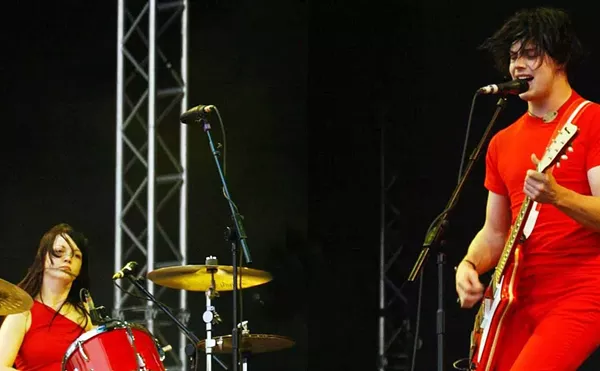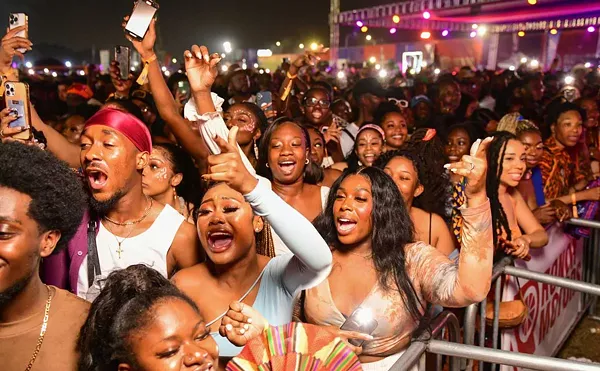
Audio By Carbonatix
[
{
"name": "GPT - Leaderboard - Inline - Content",
"component": "35519556",
"insertPoint": "5th",
"startingPoint": "3",
"requiredCountToDisplay": "3",
"maxInsertions": 100,
"adList": [
{
"adPreset": "LeaderboardInline"
}
]
}
]
John Doe, the attractive former front man of the immortal L.A. punk band, X and sometime actor (with a role in the recently demised "Roswell"), has hitched his wagon to this star, and hopes, "people can take me seriously as a songwriter now, and not just think about X, and my ‘gorgeous good looks,’" he laughs.
His latest album, Dim Stars, Bright Sky (IMusic), corrals a number of fellow solo artists (Juliana Hatfield, Aimee Mann, Rhett Miller, among others) for a series of bright, laid-back, largely acoustic tracks whose ambience recalls the softly gilded songs of ’70s singer/songwriters, spiced with a vaguely country air by Doe’s playing. Doe’s well-remembered for his duets with his former wife Exene Cervenka in X, and the album’s a reminder how good his warm, weathered baritone sounds in opposition to a woman’s voice.
Interestingly, the idea wasn’t Doe’s but that of his producer/musician friend, Joe Henry. The two were working up a couple demos, talking about who they liked when talk turned to Mann and another album contributor, Jakob Dylan, who each of them had toured with.
"I said, ‘they're only demos,’ and Joe said, ‘I don't care.’ So he called them up," Doe recounts. "I was just incredibly flattered, No. 1, that they wanted to do it, and No. 2, that after it was done that it sounded good. Because I respect all these people as singers, and I think, ‘Well, if I sound good with them, then I'm good by association.’"
Told that his duet with Mann on "This Far," sounds like midperiod X with its dragging, C&W shuffle, Doe suggests, "it’s inevitable, it’s in my soul."
Like many artists separating from a band, Doe suffered through something of an identity crisis in the early ’90s.
"Once you become established and you have a very distinct sound, like X, you feel like you have to write X music or you have to write music of that band, you can’t just write," he says. "I had a huge renaissance in, like ’95-’96 where I just said, ‘You know what? I can just write. I’m not going to write songs for X, I’m just going to write songs,’ and it was great. Freedom is good."
For Hersh, leaving behind her band Throwing Muses has been a painful experience, made all the worse because they never really quit, only ran out of the financial wherewithal to make the next album or exist on a continuing basis.
"What’s the difference between a musician and a large pizza? The pizza can feed a family of four," a pregnant Hersh jokes, before getting serious. "I pine for my band. It was really heartbreaking that we had to stop at all. That band was/is the No. 1 thing in my life since I was 14."
She can use the present tense because the band recently recorded their first new album since 1996's Limbo for release in January, the same day Hersh releases a new solo album, recorded with Andrew Bird (Squirrel Nut Zippers, Bowl Of Fire) and Howe Gelb (Giant Sand).
Together they comprise both ends of the spectrum, according to Hersh. "Limbo was ... a graceful math problem. It wasn’t clever, it was honest, but it was quite intricate, and this record sounds like we wandered into the room and made a bunch of stuff up, which is pretty much what happened," says Hersh. The solo album was "also kind of fast and dirty, but it’s the opposite end of the sound spectrum — its power is in restraint ... it’s an interesting sound. Howe kind of played backward. Andrew rises up over the top — he has a great grasp of the swell. I left a bunch of space for them in the songs and they filled it up. It’s a nice sound and it’s something I haven’t heard before."
But while she readily admits to longing for the protective shield of a loud backing band, and once confided in an interview that "playing solo acoustic is wussy, like I’m this lonely loser," she’s not about to abandon her solo artistry for the comfort of her band. In fact, she’s warmed to the solo performance.
"I have developed tremendous respect for the sound and the medium that used to be folk," she says. "You have to appreciate delicacy as a form of power. When you’re playing electric, loud equals loud. It’s a little ‘duh.’ But when you’re playing acoustic, a quiet part can be actually very loud." They’re not fronting the rambunctious bands of their youth, but with age both Hersh and Doe have learned how to draw attention without making noise.
Exilie Follies will perform Friday, Sept. 27 at Second City (2301 Woodward Ave, Detroit; call 313-965-2222). Chris Parker is a freelance writer. E-mail him at letters@metrotimes.com





